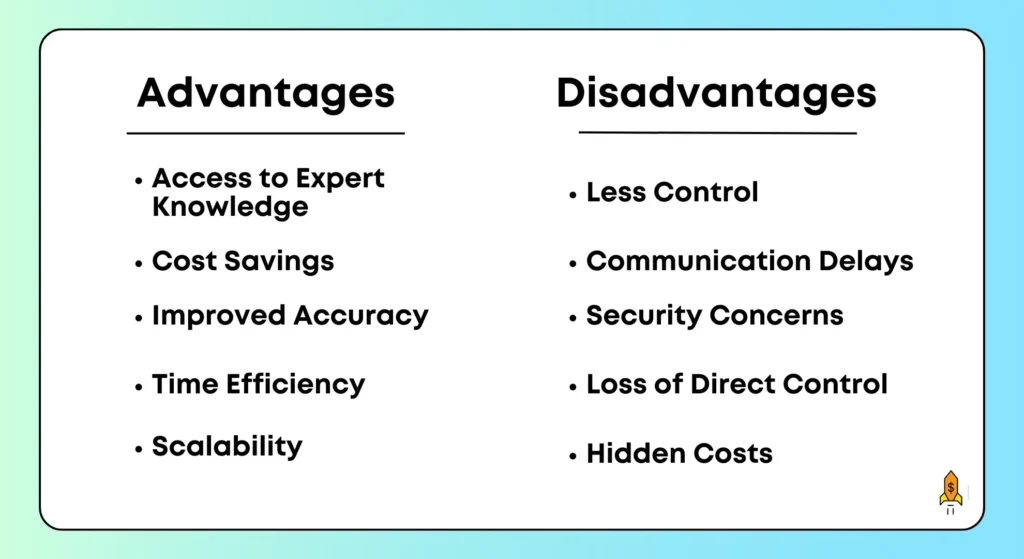As your business grows, managing finances can become increasingly complex.
You may encounter missed deadlines, inconsistencies in your financial records, or feel overwhelmed by the workload. Outsourcing your bookkeeping needs can provide much-needed relief, allowing you to focus on core business activities. But how do you know it’s the right time to consider this move?
In this blog, we’ll discuss the top 7 signs that indicate it’s time to outsource bookkeeping solutions for your business, when to consider outsourcing, how it works, the benefits, potential risks, and how to choose the right partner.
Table of Contents
When to Outsource Bookkeeping Solutions?
Deciding when to outsource bookkeeping solutions is crucial to ensuring your business runs smoothly. While many small businesses can manage with in-house bookkeeping initially, a growing business brings increased complexity. So, how do you know it’s time?
1. Your Books Are Always Outdated
If you’re constantly behind on your bookkeeping, it’s a clear sign you need help. Incorrect or obsolete financial records can result in cash flow problems and missed chances for growth. If keeping your books up to date has become a challenge, outsourcing can ensure your finances are accurate.
2. You’re Spending Too Much Time on Bookkeeping
As a business owner, your time is valuable. If you spend hours managing receipts, invoices, and reports instead of focusing on core business activities, it’s time to outsource bookkeeping solutions. With outsourced bookkeeping, you can shift your attention back to what matters most.
3. You’re Facing Compliance Issues
Accounting regulations change frequently. If you struggle to meet tax laws, deadlines, and other compliance requirements. Delegating your bookkeeping and tax responsibilities to experts helps your business stay compliant and prevents expensive penalties.
4. Frequent Financial Errors
Mistakes in your books, such as missing entries, incorrect calculations, or misreported expenses, can lead to serious financial problems. If errors become more frequent, an outsourced bookkeeping company can bring expertise and accuracy to your financial records.
5. Your Business is Growing Quickly
A rapidly growing business can overwhelm your current bookkeeping processes. New customers, increased transactions, and more expenses make financial management more complex. Outsourcing bookkeeping services helps you stay on top of these changes without missing a beat.
6. You Don’t Have Access to Financial Insights
You’re missing out on valuable information if your current bookkeeping system only tracks transactions without offering insights into profitability, cash flow, and future projections. Outsourcing bookkeeping allows you to get real-time reports and analytics from experts who can provide deeper insights into your financial health.
7. You Want to Reduce Costs
Employing an internal bookkeeper can be costly when you factor in salary, benefits, and training expenses. Outsourcing offers a cost-effective alternative, as you only pay for the services you need, making it ideal for businesses looking to cut costs.

How does outsourced bookkeeping work?
Most outsourced bookkeeping services follow a simple, structured process:
- Onboarding—The provider learns your business structure, accounting software, and reporting needs.
- Data Sharing—You securely share bank feeds, invoices, and receipts (often via cloud-based platforms).
- Regular Book Updates—Transactions are recorded, reconciled, and categorized on a weekly or monthly basis.
- Financial Reporting—You receive profit and loss statements, balance sheets, and cash flow reports on schedule.
- Ongoing Support—Providers often assist with compliance, tax preparation, and financial planning insights.
This streamlined process ensures you always have up-to-date, accurate financial information without the day-to-day hassle.
What Services Are Typically Included in Outsourced Bookkeeping?
Outsourced bookkeeping typically includes a wide range of services, depending on the business’s needs. Primary services include data entry, reconciliations, accounts payable and receivable, payroll processing, and monthly financial reporting. Additionally, we offer tax & bookkeeping solutions, listed below.
Advanced services, such as tax preparation, CFO advisory, and financial forecasting, are also often included. Profitjets offers a complete package of bookkeeping, tax, and virtual CFO services, providing holistic financial management for businesses of all sizes.
What are the advantages and disadvantages of outsourcing the business’s bookkeeping functions?
While outsourcing bookkeeping offers numerous benefits, weighing the pros and cons before making a decision is essential.

Advantages of Outsourcing Accounting and Bookkeeping Services
Outsourcing accounting and bookkeeping services goes beyond cost and time savings. Let’s take a look at some additional benefits:
1. Focus on Core Business Activities
As you outsource, you can focus your energy on areas that directly contribute to your business’s success, such as sales, marketing, and customer service.
2. Scalability for Business Growth
Outsourcing offers flexibility. While your business grows, your financial needs evolve. Outsourced bookkeeping companies can quickly scale their services to accommodate this growth, whether you need additional tax services or advanced financial reporting.
3. Access to Technology
Outsourcing partners typically use the latest bookkeeping software, ensuring faster, more accurate reports and real-time financial insights. This access to technology can provide a competitive edge.
4. Minimizing Financial Risks
Outsourcing minimizes the chances of financial mismanagement. Whether keeping up with tax deadlines or reconciling bank accounts, professional outsourced bookkeeping solutions ensure your financials are managed carefully, helping you avoid costly mistakes.
Disadvantages or Risks and How to Mitigate Them
While outsourcing has clear benefits, there are risks:
- Data Security—Always choose a provider with secure, encrypted data handling.
- Less Direct Oversight – Use clear reporting schedules and communication protocols.
- Dependency on Provider – Select a reputable company with a proven track record.
The right partner will have systems in place to minimize these risks.
How Much Does Outsourcing Bookkeeping Cost?
The cost of outsourcing bookkeeping varies depending on several factors, including the size of your business, the complexity of your bookkeeping needs, and the type of services required.
In 2025, basic bookkeeping services can range from $300 to $800/month in the U.S. or ₹5,000 to ₹50,000/month if outsourced internationally. Full-service solutions, including virtual CFO support and tax filing, can range from $2,500 to $20,000/month.
On average, small businesses are expected to pay between $500 and $2,500 monthly for outsourced bookkeeping services. These include basic services such as data entry, payroll management, and tax preparation, as well as more advanced services such as CFO advisory and financial analysis.
Outsourced bookkeeping is usually more affordable than hiring an in-house accountant, especially when you factor in employee benefits, training, and overhead costs. Profitjets offers flexible pricing tailored to your business’s specific needs.
How Do I Choose the Right Bookkeeping Outsourcing Company?
When choosing the right bookkeeping outsourcing company, it’s crucial to consider factors like experience, industry knowledge, and the range of services offered. Look for companies specializing in bookkeeping for your specific industry, as they will better understand the financial challenges and regulations you face.
Transparency is also crucial. Ensure the company provides transparent pricing, regular communication, and access to your financial data. Client testimonials and reviews will help you understand the company’s reliability. Profitjets, for instance, has years of experience offering tailored bookkeeping services to almost all industries, ensuring accuracy and compliance with regulations.
How Does Outsourced Bookkeeping Compare to In-House Bookkeeping?
Outsourced bookkeeping solutions are often more cost-effective and flexible than in-house bookkeeping. While in-house bookkeepers are on payroll and come with additional costs like benefits and training, outsourced services allow businesses to pay only for what they need when they need it.
Outsourced bookkeeping also offers access to a team of financial experts, ensuring a broader range of services and insights than an in-house bookkeeper might provide. This is primarily useful for small and medium-sized businesses that require advanced financial services but can’t afford a whole in-house team.
Outsourced vs. In-House Bookkeeping
| Factor | Outsourced Bookkeeping | In-House Bookkeeping |
| Cost | Lower (pay for what you need) | Higher (salary + overhead) |
| Expertise | Access to specialists | Limited to the employee’s skills |
| Flexibility | Easily scalable | Requires new hires |
| Control | Less direct supervision | Full control in-house |
How Profitjets Helps with Outsourced Bookkeeping Solutions
Profitjets is a trusted partner for outsourcing bookkeeping solutions. We offer a comprehensive service tailored to fulfill the needs of small and medium-sized businesses. From tax consultation & bookkeeping solutions to virtual CFO services and accounting services, we handle everything so you can focus on what matters most—growing your business.
Our team of expert bookkeepers ensures accurate financial records, timely tax preparation, and detailed financial reporting. With us, you’ll never have to worry about compliance or errors in your books again. Whether you need ongoing bookkeeping or specialized tax services, Profitjets has the right solution.

Conclusion
With outsourced bookkeeping solutions, you can save time, reduce costs, and ensure accuracy. Don’t wait until financial management becomes overwhelming. Contact Profitjets today and let us handle your books while you focus on taking your business to new heights.
By outsourcing your bookkeeping to Profitjets, you can ensure financial accuracy, gain valuable insights, and minimize stress. Let our qualified team handle your books while you focus on growing your business.
FAQs – Outsourced Bookkeeping Solutions
1. Is outsourcing bookkeeping a good idea for small businesses?
Yes. Outsourcing bookkeeping is often more cost-effective and efficient for small businesses than hiring an in-house bookkeeper. It provides access to experienced professionals, ensures accurate and timely financial records, and frees up your time to focus on growing your business. With flexible pricing models, you only pay for the services you need, making it a budget-friendly option for startups and small enterprises.
2. Can outsourcing bookkeeping help with tax preparation?
Absolutely. Well-maintained books make tax filing faster, more accurate, and less stressful. Outsourced bookkeepers ensure your financial records are up-to-date and categorized adequately throughout the year, reducing the risk of errors or missed deductions. Many providers also work directly with your CPA or tax accountant to streamline the process.
3. What services are typically included in outsourced bookkeeping?
Outsourced bookkeeping solutions usually include recording transactions, reconciling bank and credit card accounts, managing accounts payable and receivable, processing payroll, tracking expenses, generating financial reports, and assisting with budgeting and tax preparation. Some providers also offer inventory tracking and compliance monitoring.
4. How much does outsourced bookkeeping cost?
The cost of outsourced bookkeeping depends on transaction volume, complexity, and the range of services you need. In the US, small businesses typically pay between $300 and $2,500 per month. Many providers offer fixed monthly packages so you can budget with confidence.
5. What are the main benefits of outsourcing bookkeeping?
Key benefits include cost savings, time efficiency, improved accuracy, compliance support, scalability as your business grows, and better financial insights through timely reports. Outsourcing also removes the need for hiring and training an in-house team.
6. How do outsourced bookkeeping services work?
After onboarding, you securely share your financial data with the provider. They record and reconcile transactions, generate reports, and provide regular updates. Most work is done via cloud-based accounting software, ensuring real-time access to your financial information.






